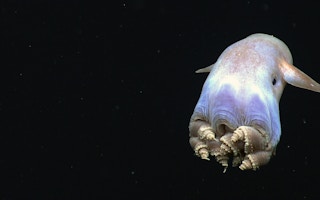Delegates at this year’s global conservation summit have voted overwhelmingly in support of a motion that calls for a moratorium on deep-sea mining and the reform of the International Seabed Authority (ISA), the UN-mandated body tasked with regulating this activity.
Eighty-one governments and government agencies attending the IUCN World Conservation Congress voted in favor of the moratorium, laid out in Motion 69, while 18 voted against and 28 abstained. Five hundred and seventy-seven NGOs and civil society organisations also voted in favor, while only 32 voted against and 35 abstained.
Farah Obaidullah of the Deep Sea Conservation Coalition (DSCC) called the motion’s approval “excellent news.”
“We’re very happy to see … such overwhelming support for Motion 69,” she told Mongabay in an interview. “It sends a clear and resounding message to the International Seabed Authority that there is no social license and no global appetite to mine the deep sea.”
Deep-sea mining activities would target three types of deep-sea habitat to extract minerals: abyssal plains, seamounts, and hydrothermal vents. Proponents say deep-sea mining would be less destructive to biodiversity than terrestrial mining, and that the extraction of minerals from the seafloor is necessary to fuel the rise of renewable energy technologies, such as electric cars. But a large consortium of conservationists and scientists say that deep-sea mining would irreversibly damage deep-sea habitats as well as other parts of the ocean, and that renewable energy technologies could rely on terrestrial mining and metal recycling programs to acquire the minerals they need.
While deep-sea mining has yet to begin, the ISA has already granted 16 licenses to explore for minerals in the Clarion Clipperton Zone, a region in the Eastern Pacific Ocean believed to be one of the most biologically diverse parts of the ocean.
In June, the South Pacific nation of Nauru triggered what’s known as the “two-year rule,” which would require the ISA to allow the nation to begin mining in two years’ time under whatever regulations have been established by then. Nauru sponsors a subsidiary of a Canadian company previously known as DeepGreen. Recently, DeepGreen formally merged with Sustainable Opportunities Acquisition Corporation to form The Metals Company, which is valued at $2.9 billion.
Matthew Gianni of the DSCC said that if deep-sea mining is allowed to begin in two years, there could be a “gold rush” as other countries and companies seek to obtain licenses.
“The big problem we have is that once the International Seabed Authority opens the door to mining, it will be almost impossible to close it,” he told Mongabay in an interview at the IUCN congress in Marseille. “And if DeepGreen or other companies begin mining, make a profit and begin paying royalties to the ISA, and money … to the government that sponsors it … other governments and other companies are going to want to jump in on this.”
Previously, more than 450 marine science and policy experts from 44 countries signed a statement calling for a moratorium on deep-sea mining, saying that deep-sea mining could substantially and irreparably damage the deep-sea ecosystem and that there isn’t enough scientific research to fully understand the negative effects of mining in the deep sea.
The South Pacific island nation of Fiji is one country that voted in favor of Motion 69 for the moratorium on deep-sea mining. Joshua Wycliffe of Fiji’s Ministry of Waterways and Environment said that the motion will be a “strong signal” coming from the IUCN, but that action must follow.
“If there is no action, then it just becomes yet another [piece of] paperwork,” Wycliffe told Mongabay in an interview at the IUCN Congress. “We need to show action behind it. We need to do something concrete.”
Obaidullah said this motion is one of many messages being sent to the ISA that the world does not agree with the launch of deep-sea mining. “[It’s] loud and clear,” she said, “do not rush into embarking on another reckless activity such as deep-sea mining.”
This story was published with permission from Mongabay.com.

















